Some circumstances call for a camera that can survive whatever the world can throw at it, and for such situations, the clear choice is an action camera. While a DSLR or smartphone may shatter when dropped, or fizzle out and die when dunked in the briny deep, an action camera will endure all but the most extreme catastrophes. GoPro is by far the best known and most established action camera company — so much so that you most likely identify action cameras as “GoPros.”
However, there are more options available to consumers, with DJI and Insta360 throwing their hats in the ring with cameras that rival GoPro for the action camera crown. It’s a shockingly even match, and more a matter of which is right for you than which is best. I’ve spent the past year extensively testing the GoPro Hero 10 Black, DJI Action 2, and Insta360 One RS so that I can help you pick the ideal action camera.
Usability
With action cameras, an important factor to consider is how easy they are to use in the field. It’s important to be able to start and stop recording quickly and easily in adverse conditions. In this regard, the Hero 10 Black is the clear winner for a couple of reasons. Primarily, that great big record button on top is by far the easiest to find by feel, even with thick ski gloves on. The other two are fine in this regard, but I was never as sure of whether I had actually activated or ended recording with them.
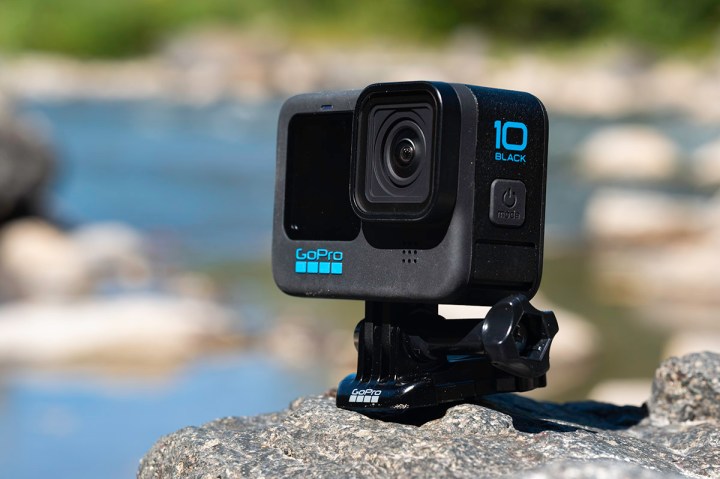
Menu systems are also a big part of usability, and the GoPro is also the clear winner here. It’s got a bigger screen and a better interface. The Action 2 is not far off, however, and it’s only the One RS that really falls behind in this regard.
In terms of ease of mounting/demounting each camera, they are also fairly evenly matched. With the One RS, the external bracket has the action camera mount built-in, while the Hero 10 has a retractable action camera mount built into the camera body. The DJI Action 2 uses its unique magnetic design to great advantage, as it easily snaps into several different compatible mounts, including a magnetic necklace. Furthermore, it can be magnetically attached to just about any metal surface.
Winner: GoPro Hero 10 Black
App and connectivity
All three companies have developed extremely powerful and competent software solutions for connecting cameras to smart devices or PCs. You can’t really go wrong with any one of them in this regard, but I’ve really come to love using the Insta360 app on my iPad Mini. It’s just so easy to connect the app to the camera that I find myself doing so frequently, something I’ve never been able to say of any other camera connection app. It’s also a great way of editing and producing 360 videos captured with the 360 module for the One RS.
Winner: Tie
Versatility
A recent trend with action cameras has been to expand their capability by producing modular cameras with a variety of optional accessories. Insta360 really kicked off this trend with the One R, but now GoPro and DJI have closed the gap with novel approaches.
The One RS offers three different lens modules: A standard action camera, a large sensor Leica camera, and a 360 camera. These three cameras deliver an impressive degree of versatility in terms of different video capture options.
However, the DJI Action 2 features a frankly incredible magnetic modular system that makes it super quick and easy to swap batteries. Also, the Action 2 is compatible with the DJI Mic, which is a high-quality wireless lav mic. That, to me as a video creator, is extremely useful.
A standard GoPro certainly can’t compete with fully modular systems in terms of versatility. However, GoPro has been actively and ambitiously developing external accessories to remedy this. A great example of this is the brand’s recently released Creator Edition, which bundles the Hero 10 Black with such accessories, including a directional microphone called the Media Mod, an LED light, and a battery/control grip called the Volta.
The GoPro audio isn’t quite as crisp for vlogging as with the clip-on DJI Mic, but the bundle is very attractively priced, and the little LED light is definitely an advantage. I recently reviewed the Creator Edition, and despite some issues with the Volta’s connection through the Media Mod to the GoPro, it’s a fantastic and effective video creation tool.

Given that all three cameras offer unique takes on modularity, each with its own pros and cons, I have to declare it overall a tie between them in terms of versatility.
Winner: Tie
Portability
The DJI Action 2 wins this category because it is fully functional with only its tiny camera module. This makes it both super small and ultra-light. The GoPro Hero 10 is a larger, bulkier camera, but still very small, and if size/weight is an issue you could opt for the new Hero 10 Black Bones, which reduces the weight to a third of the standard model. The Insta360 comes in last, as it is quite large and heavy when fully assembled compared to the other two.
Winner: DJI Action 2
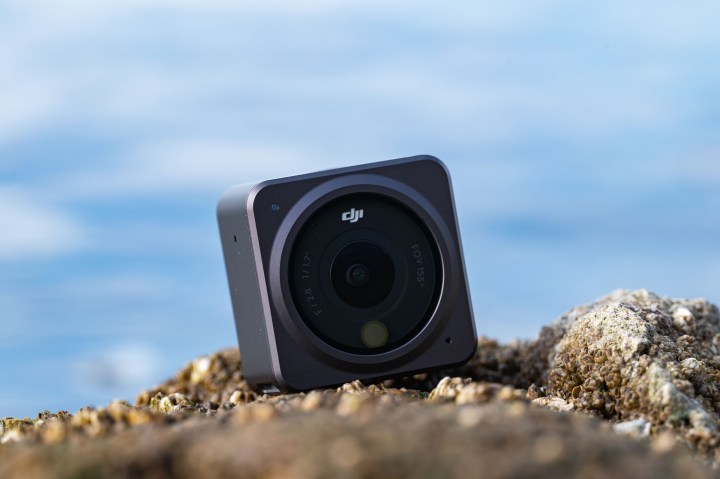
Durability
All three cameras are very rugged and able to operate underwater or survive serious falls. The Hero 10 Black edges the others out due largely to its all-in-one design. I trust it the most in situations where it’s likely to come into harm’s way, and it generally seems to be an incredibly rugged piece of kit.
The DJI Action 2’s core camera module is completely sealed, with no openings in its casing whatsoever, so when used in its most minimal form, it might arguably be said to be tougher than the GoPro. I’ve had it sitting out recording a long-term timelapse of an ant mound for the past month, where it has endured rain, snow, and vicious attacks by marauding raccoons and woodpeckers.
However, if you want to use the Action 2 with the selfie screen module or battery module attached, then it is suddenly not waterproof at all. You’ll need the optional diving case to make the camera waterproof with an extra module attached. Another very minor issue worth mentioning is that the magnets in the Action 2 are liable to pick up magnetic particles present in loose dirt, and such particles are somewhat difficult to clean due to the strength of the magnets. This doesn’t interfere with the operation of the camera, however.
The Insta360 One RS is also quite tough and waterproof when fully assembled. However, I have found through extensive use that the cover for the USB/microSD ports is not the most reliable, and if it isn’t properly sealed or if it falls off and is forgotten, then the waterproofing of the device is badly compromised.
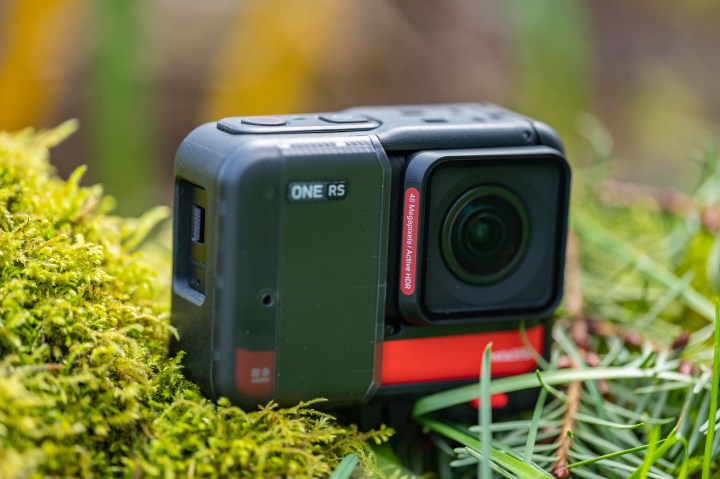
While the GoPro is my overall pick for the most durable action camera, it does need to be noted that if you use the Media Mod and the Volta battery grip together with the Hero 10, that configuration isn’t waterproof.
Winner: GoPro Hero 10 Black
Image quality
The longer I use these cameras, the harder I find it to pick one for the quality of video it produces. Given enough tweaking, I’m fairly certain one could alter the footage from any one of these cameras to match the others. However, the Insta360 One RS does give you the option of buying a Leica lens module with a large sensor that greatly increased image quality. For that reason, I’m giving the One RS the win here.
Winner: Insta360 One RS
Value
Each of these cameras falls within a similar price range, depending on which bundle or kit you choose. The least expensive is the Insta360 One RS, which starts at just $300 for the camera with just the 4K Boost module. Next the GoPro Hero 10 and DJI Action 2 both start at $400. While the Insta360 is significantly cheaper at its base price, with only the basic 4K Boost module it doesn’t hold up so well to the DJI and GoPro, so in terms of value it balances out that price gap.
Moving up to higher-end bundles, the DJI Action 2 dual-screen combo will set you back $520, while the Insta360 One RS bundled with the 360 module costs $550. The Hero 10 Black Creator Edition comes in at $582, but considering the accessories included in that kit, that higher price is justified. If you want the DJI Mic to use with the Action 2, that costs an additional $330, while the 1-inch sensor mod for the Insta360 One RS is $300.
It needs to be noted that if you want the above pricing on GoPro products you need to also purchase a $50 annual subscription. I’ve taken the liberty of including that subscription in the pricing since it’s more representative of the actual cost to the end-user. The GoPro subscription is a great value in and of itself, considering that it offers unlimited cloud storage of your GoPro footage among other benefits.
Considering how close they are in pricing, the value becomes more of a factor that needs to be determined by the end-user, depending on your unique needs. However, GoPro’s discount tied to their subscription service is so good that it gives them an edge here, particularly if you opt for the Creator Edition.
Winner: GoPro Hero 10 Black
Conclusion
When I set out to compare these cameras, I had the idea that each would win a clear victory in a particular niche. However, I now find that they are all such well-rounded devices that even in categories where there is a clear victor, the others are never far behind. The fact is that never before have consumers been provided such a great selection of action cameras to choose from. With that said, I do have some buying advice to help you pick which one of these cameras is best for you.
GoPro Hero 10 Black
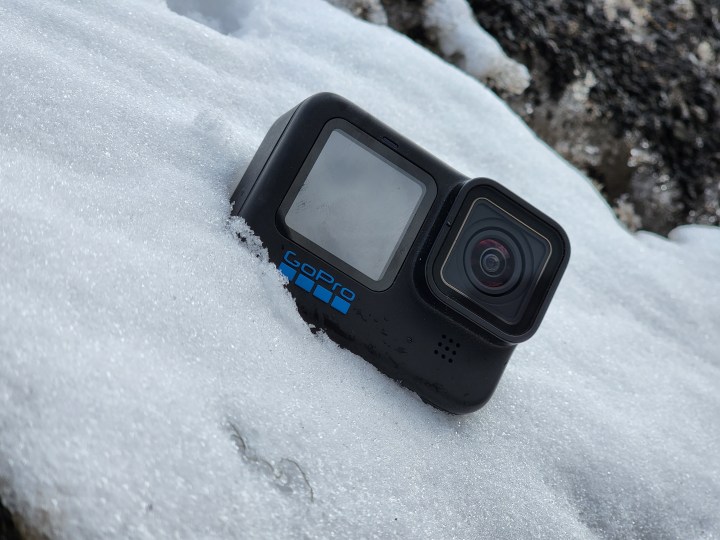
This is the camera to choose if you just need a camera that will survive anything you throw at it and deliver high-quality footage without any fuss or muss. It’s a jack-of-all-trades solution that is an evolutionary refinement of the action camera formula. The Hero 10 is extremely polished, and there’s a reason GoPro has been such a trusted name in this space for so long. It’s the best action camera to use on a helmet because of how easy it is to activate and record footage in demanding and intense scenarios.
GoPro Hero 10 Black Full ReviewDJI Action 2

Speaking of novel concepts, the Action 2 is certainly that. Choose this camera if size and weight are significant factors, or if you can think of something clever to do with its powerful magnetic attachment system. It’s also the best for vlogging if you also have the DJI Mic; combine these two products and you have a professional-caliber recording setup small enough to fit in your pocket.
This is my favorite of these three cameras for capturing timelapse video due to its small size and magnetic module system. The small size makes it easy to place in awkward locations, and the magnetic system reduces the hassle of recharging and attaching/detaching from tripods.
DJI Action 2 Full ReviewInsta360 One RS
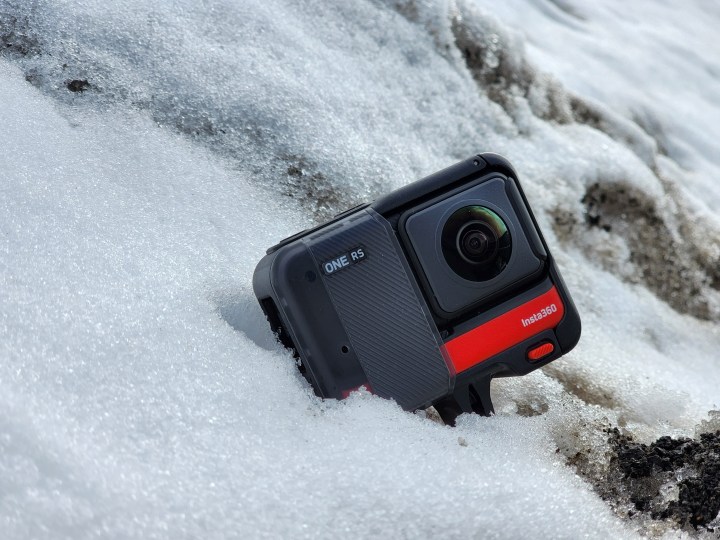
Want to shoot 360 photos and video? Want an action camera with a larger sensor? If you answered yes to either of those questions, then the One RS is for you. This is the absolute best way to get started shooting 360 videos, as it doesn’t necessitate buying a separate 360 camera.
Thanks to the 360 lens and its modular design, the One RS offers the most fun of any action camera you can buy. If you don’t have a particular project in mind and just want to record some cool video clips of your vacation, then the One RS is the one for you.
Insta360 One RS Full Review


